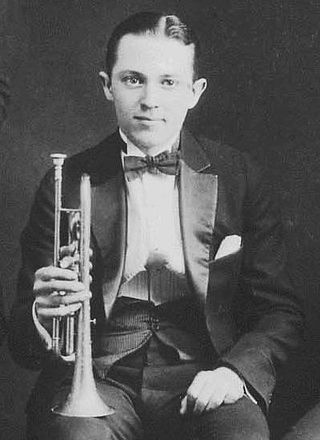
Leon Bismark "Bix" Beiderbecke was an American jazz cornetist, pianist and composer.

Eddie Lang was an American musician who is credited as the father of jazz guitar. During the 1920s, he gave the guitar a prominence it previously lacked as a solo instrument, as part of a band or orchestra, and as accompaniment for vocalists. He recorded duets with guitarists Lonnie Johnson and Carl Kress and jazz violinist Joe Venuti, and played rhythm guitar in the Paul Whiteman Orchestra and was the favoured accompanist of Bing Crosby.
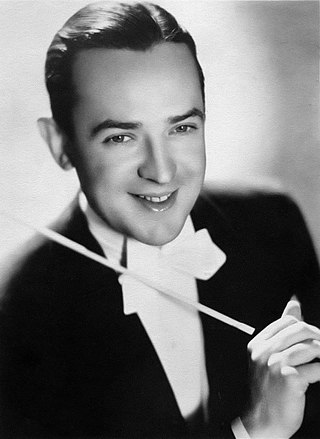
James Francis Dorsey was an American jazz clarinetist, saxophonist, composer and big band leader. He recorded and composed the jazz and pop standards "I'm Glad There Is You " and "It's The Dreamer In Me". His other major recordings were "Tailspin", "John Silver", "So Many Times", "Amapola", "Brazil ", "Pennies from Heaven" with Bing Crosby, Louis Armstrong, and Frances Langford, "Grand Central Getaway", and "So Rare". He played clarinet on the seminal jazz standards "Singin' the Blues" in 1927 and the original 1930 recording of "Georgia on My Mind", which were inducted into the Grammy Hall of Fame.

Orie Frank Trumbauer was an American jazz saxophonist of the 1920s and 1930s. His main instrument was the C melody saxophone, a now-uncommon instrument between an alto and tenor saxophone in size and pitch. He also played alto saxophone, bassoon, clarinet and several other instruments.
Riverwalk Jazz was a popular weekly public radio series distributed by Public Radio International that ran from 1989 to 2012.
Martin Oliver Grosz is an American jazz guitarist, banjoist, vocalist, and composer born in Berlin, Germany, the son of artist George Grosz. He performed with Bob Wilber and wrote arrangements for him. He has also worked with Kenny Davern, Dick Sudhalter, and Keith Ingham.

"Mississippi Mud" is a 1927 song written by Harry Barris, first sung by Bing Crosby as a member of Paul Whiteman's Rhythm Boys. Its musical composition entered the public domain on January 1, 2023.
Wilford F. (Min) Leibrook was an American jazz tubist and bassist.

James "Rosy" McHargue was an American jazz clarinetist, associated principally with the Dixieland jazz scene.
Joseph Anthony "Fud" Livingston was an American jazz clarinetist, saxophonist, arranger, and composer.

Bix is a 1991 Italian drama film directed by Pupi Avati and starring Bryant Weeks. The plot is about the final years of cornet player Bix Beiderbecke. It was entered into the 1991 Cannes Film Festival.

Jazz is the seventh album by Ry Cooder, produced by Joseph Byrd and Ry Cooder and released on the Warner Bros. Records label.

The Happy Horns of Clark Terry is an album by American jazz trumpet and flugelhorn player Clark Terry featuring performances recorded in March 1964 for the Impulse! label. Reissued in 2012 to commemorate the 50th anniversary of Impulse! Records, it resurfaced with Terry's only other record for the label as a solo leader, It's What's Happenin'.
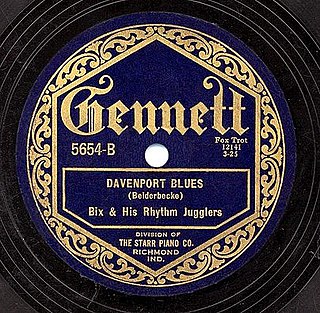
Davenport Blues is a 1925 song composed and recorded by Bix Beiderbecke and released as a Gennett 78. The song has become a jazz and pop standard.

The Smithsonian Collection of Classic Jazz is a six-LP box set released in 1973 by the Smithsonian Institution. Compiled by jazz critic, scholar, and historian Martin Williams, the album included tracks from over a dozen record labels spanning several decades and genres of American jazz, from ragtime and big band to post-bop and free jazz.
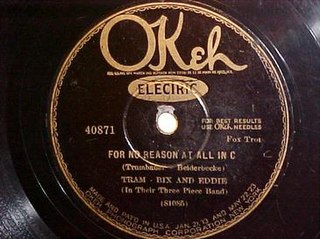
"For No Reason at All in C" is a 1927 jazz instrumental by Bix Beiderbecke, Frankie Trumbauer, and Eddie Lang. The song was released as a 78 single in 1927 on Okeh Records as by "Tram, Bix and Eddie ".

The Bucktown Five was a jazz group active in the early 1920s in the Chicago area of the United States. The group played a New Orleans style of collective improvisational jazz and were forerunners of the Chicago style which developed in later years. About eighteen months after breaking up, many of the same players recorded in Chicago as the Stomp Six. The Bucktown Five also recorded with Bix Beiderbecke.

Clarinet Marmalade, later Clarinet Marmalade Blues, is a 1918 dixieland jazz standard composed by Larry Shields and Henry Ragas of the Original Dixieland Jass Band. It is played in the key of F major. It was recorded by Fletcher Henderson in 1926 and Frankie Trumbauer in 1927.
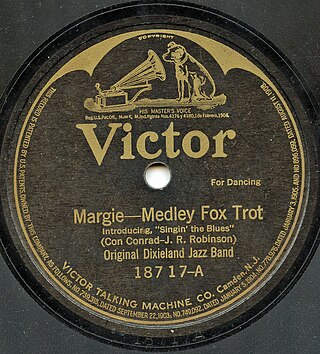
"Singin' the Blues" is a 1920 jazz composition by J. Russel Robinson, Con Conrad, Sam M. Lewis, and Joe Young. It was recorded by the Original Dixieland Jass Band in 1920 as an instrumental and released as a Victor 78 as part of a medley with "Margie". The song was released with lyrics by vocalist Aileen Stanley in 1920 on Victor. In 1927, Frank Trumbauer, Bix Beiderbecke, and Eddie Lang recorded and released the song as an Okeh 78. The Trumbauer recording is considered a jazz and pop standard, greatly contributing to Frank Trumbauer and Bix Beiderbecke's reputation and influence. It is not related to the 1956 pop song "Singing the Blues" first recorded and released by Marty Robbins in 1956.
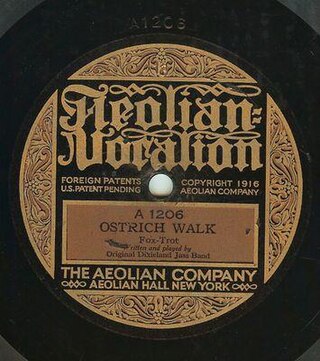
Ostrich Walk" is a 1917 jazz composition by the Original Dixieland Jass Band released as an instrumental as an Aeolian Vocalion and a Victor 78. Frankie Trumbauer and Bix Beiderbecke recorded the song in 1927. The song is a jazz milestone as one of the first commercially released "jass" or jazz recordings.
















